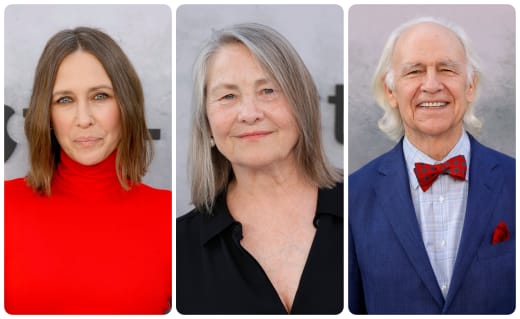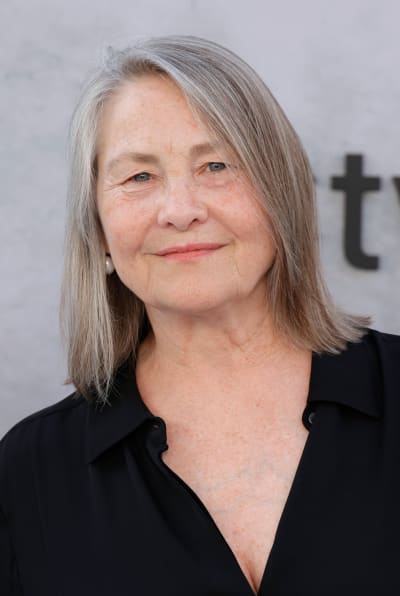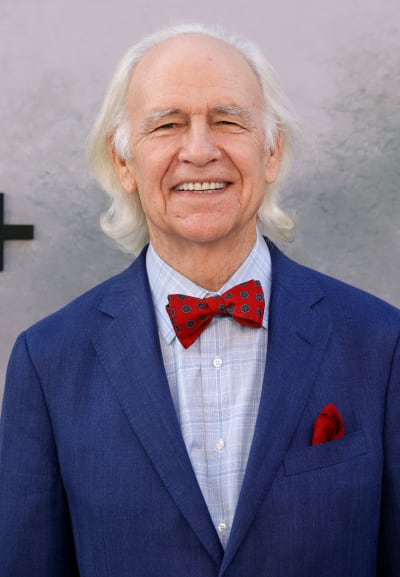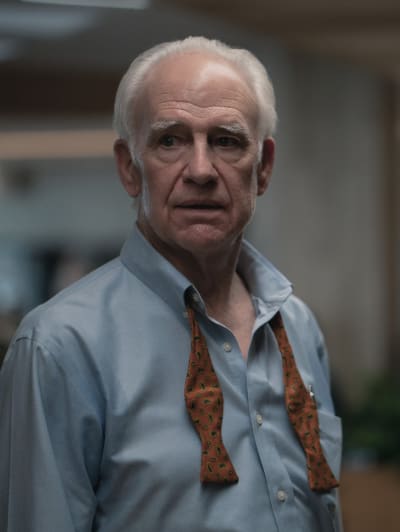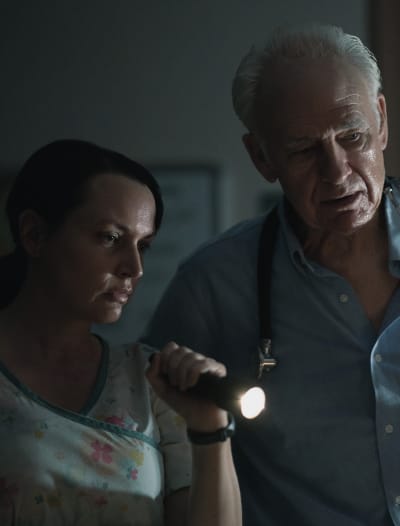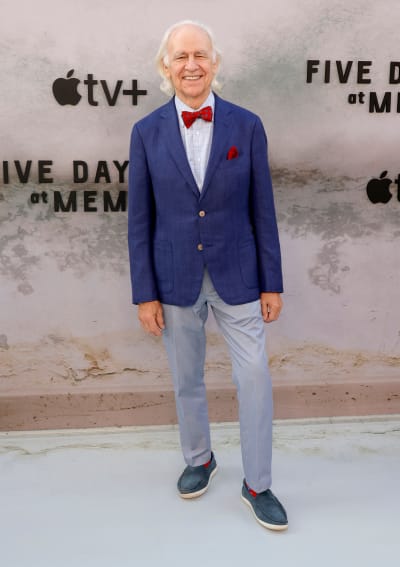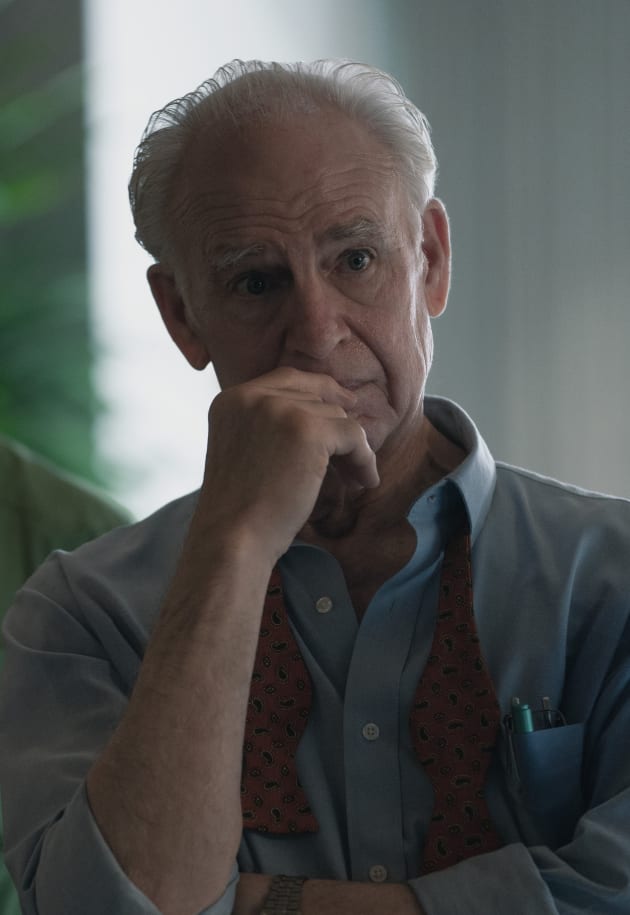
Now that you’ve seen Five Days at Memorial Season 1 Episode 5, you know the extent of the horror that befell patients, visitors, and staff in the days after Katrina.
It’s also the right time to get insight into the central players, Dr. Anna Pou, Susan Mulderick, and Dr. Horace Baltz.
Vera Farmiga, Cherry Jones, and Robert Pine share their thoughts on doing the characters justice and helping the audience connect with the real people they portrayed.
First up, we had a brief conversation with Vera and Cherry together, and they spoke about the responsibility they felt to get it right.
Starting with you, Vera, you’re playing a cherished doctor who was forced to make impossible decisions during an absolute unthinkable situation. How did you feel to walk in her shoes, if only to tell that story?
Vera: I felt an enormous responsibility to get it right because I think that the task for me was to put you, the audience, in her very shoes and do that by exhibiting everything she was up against, the psychic, emotional, mental, physical, spiritual duress.
And really, just trying my darnedest. I did my best to show what that was like. That was the job.
And, Cherry, same for you. Susan was basically left holding the bag for everyone without a disaster plan. What was it like imagining yourself in her position?
Cherry: Well, again, unless you are the person going through the trauma, you cannot begin to imagine. I tried to imagine having every eye in that hospital looking at you for the answer and not having an answer, only having the next thought of how we might be able to attain what needs to happen.
And one of my personal favorite moments of my characters is when we don’t know if the helicopter pad will support a helicopter, and it hasn’t been used in 20 years. And she says, “Who here has any kind of understanding about engineering?” And then she sends them up with a bone saw.
I mean, it was just the level of desperation of trying to figure out how to get 2,000 people out of that hospital. I have such respect for my character. And I will say that we also understood, well, I certainly felt that the whole series, the whole story is a sacred one because there was such loss of life.
It has to have been the most traumatic times in any one of these characters’ lives. And John Ridley and Carlton Cuse are such gentlemen, and such solid human beings, that we were never allowed to forget that.
We had quite a bit more time with Robert Pine, so he was able to share more in-depth what makes Five Days at memorial such an important part of our cultural discussion.
Why did you want to be a part of this project?
Well, it was the script, first of all. My introduction was just two scenes that they wanted me to read to see if I was their guy. And just reading those, which were very incredibly well written, very personal, and therefore, very easy to do. And so that was my little taste.
And then, once they said, “You have the part,” I got the rest of the scripts and read them. And I said, “Boy, this is great.” And as I’ve told other people, this is probably the best professional experience I’ve had in 57 years of doing this, so that’s saying a lot.
Wow. What did you like about playing Dr. Baltz? What about him and his demeanor did you appreciate?
Well, I went to college wanting to be a doctor. I was a pre-med.
Oh!
And after four years of banging my head against the wall and being a confirmed C-plus student, I knew this wasn’t flying very far. And so somebody said, “Well, why don’t you be an actor? You always liked that.” I said, “Hey, that’s a great idea.” So I did.
And I would say Horace Baltz was sort of the doctor I would like to have been. I’d always fantasized about being a country doctor in Vermont and, with my little black bag, going out at midnight and birthing some kid.
And if you really think about it for a while, it really is like an MGM movie of the ’30s. I already, without knowing it, wanted to play a doctor rather than be a doctor.
And so Baltz, I admired his character. He was a very ethical man. He lived by the oath he took, which do no harm. And he was the oldest man on the team in the hospital. He’d been there longer than anybody.
And he was known, I guess, for his cool head. And he had a gentle sense of humor and knew how to keep the lid on a hotpot.
And so that’s why I liked the character, and I loved how they wrote him and how they wrote all the other characters. I thought our show was incredibly well cast, everyone was so spot on to their characters.
What would you have liked to have asked Dr. Baltz if you would’ve had the opportunity?
Boy, that’s a good question. Because he had died three years beforehand, and none of us spoke to our real-life characters, and I don’t think anybody would’ve done it anyhow because this is a story. We are giving these people a humanity and an essence of who they were.
This is a story. So based on facts. But what would I have liked to ask him?
Well, I would like to ask him the very question that you would ask him. What do you think of the show? Did we pull it off? Did we tell this story to your satisfaction? And if not, where did you find the holes that you would’ve gone like that or that? And I would think that he would’ve liked what we did.
I think Sheri Fink, the writer of the book, Five Days at Memorial, on which this was taken, would agree with that because she knew Baltz very well and liked him, and they had a good relationship.
At one point, your character talks about the horrifying conditions that led to the decisions that should not have been made.
In your opinion, do you think they could have made better decisions given everything they were up against? Or did they do pretty much what people in their situation do?
I’m going to dodge that in a way. I’m going to say that my opinion isn’t important, and it isn’t. It’s to the audience that it’s important.
Their opinion is very important because what we would like we, as you’ve watched it, we don’t paint anybody as a good guy or a bad guy. That is not our intent. We’re trying to portray them, the essence of who these people were. Nobody in this goes out to be the devil or whatever you want to put it.
But it’s to the audience when this is over that they silently are asked, what would you have done in that situation? Faced with those same challenges, what would you have done? Because that’s the question that this show wants to ask, I think. That’s just my opinion. And it’s a pretty weighty question.
It most certainly is.
And the parallels, of course, are to COVID, and people are having to make these kinds of decisions. I use the example that there are three respirators and eight patients that need a respirator. How do you pick those three that get it? That’s got to be a horrible decision that will live with people forever.
And a lot of people, as you know, the caregivers have quit the business because it is so traumatic. It’s hard to do that. And there’s no place where they go and bring you down or stuff.
I mean, you just say, see you later, you’re going home, and you got to go home and take it home with you to your family and everything. It’s difficult.
So my feeling is, that my opinion doesn’t matter. What’s important is what the viewer thinks after they see this, how does it affect them? What would I have done in that situation? Wow. I hope I never get there.
Five Days at Memorial airs on Apple TV+, with new episodes dropping each Friday.
Carissa Pavlica is the managing editor and a staff writer and critic for TV Fanatic. She’s a member of the Critic’s Choice Association, enjoys mentoring writers, conversing with cats, and passionately discussing the nuances of television and film with anyone who will listen. Follow her on Twitter and email her here at TV Fanatic.

